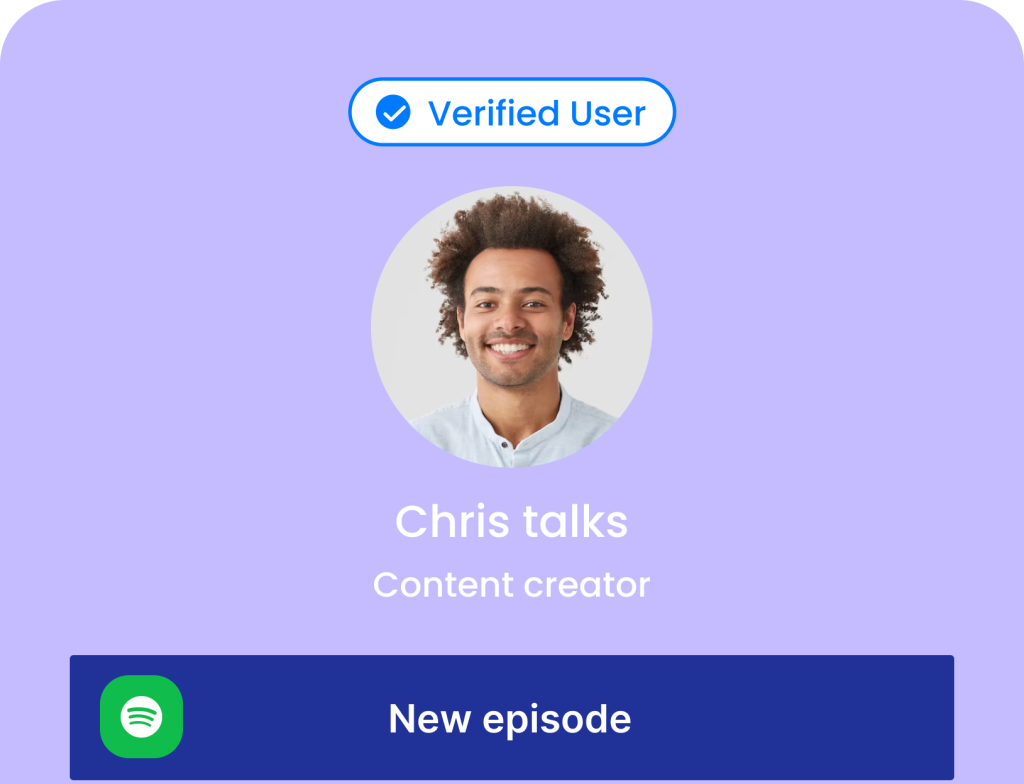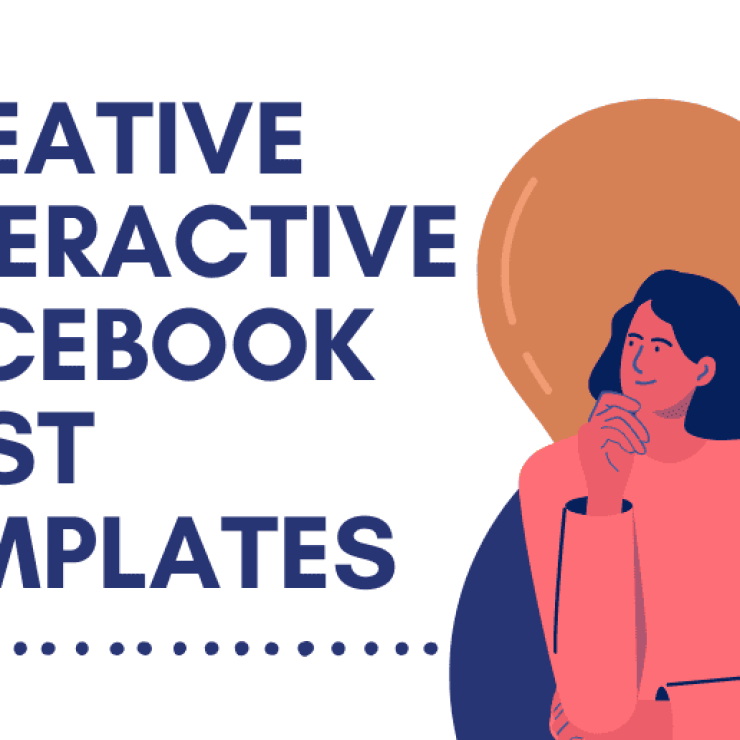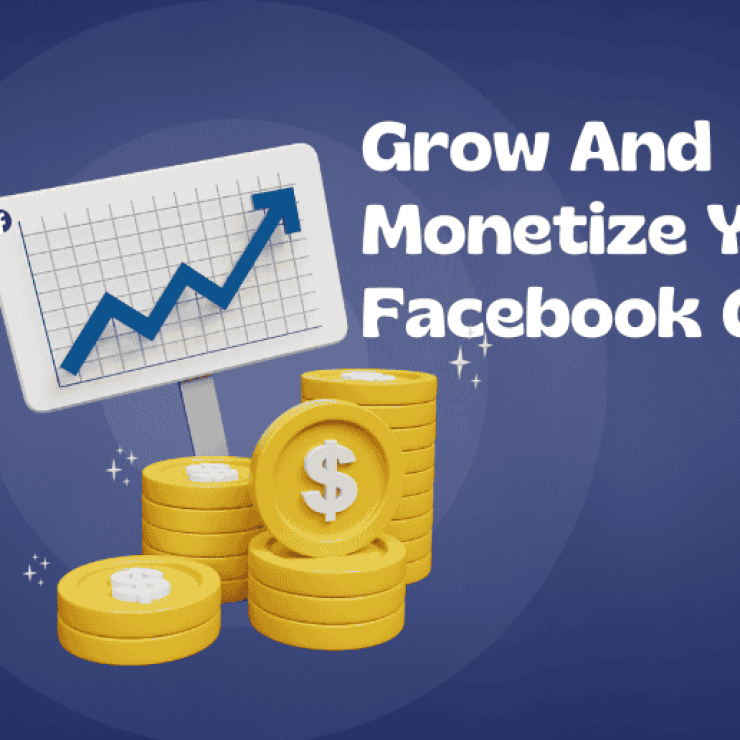Every social media strategy, post, and piece of content has one main goal, to help creators, brands, and businesses achieve their objectives. This can either be to build awareness, drive sales, or grow a community. Regardless, success depends on more than just creating content as creators now need to understand what works, what doesn’t, and why. For this understanding, creators need access to data or analytics reports.
Nearly every social platform today offers native analytics, from Instagram Insights to TikTok Analytics. While these tools are useful, they often come with limitations such as restricted metrics, lack of customization, and difficulties tracking performance across multiple platforms. This is why businesses and creators turn to the social media reporting tools to get a complete picture of their digital performance.
In simple terms, social media analytics and reporting tools gather, organize, and present key data that helps you make smarter decisions. Make no mistake, there are a lot of analytics tools available today but using the best social media reporting tools for creators can boost engagement, increase ROI, and fine-tune your strategy for long-term growth.
Social media has moved beyond just the posting of content. With increased competition, creators now need to know if their efforts are working and where to best channel them. That’s why reporting is so important, as it turns likes, clicks, and shares into clear insights.
With the best social media reporting tools, creators can enjoy the following benefits:
1. Know your audience better
Every follower has unique interests. Social media reporting tools reveal audience demographics, locations, and behaviors. This knowledge helps you create content that feels personal, builds trust, and increases engagement, leading to stronger results over time.
2. Measure real impact
Analytics tools tell you if your efforts are working or not. These tools track conversions, reach, and ROI, showing whether your campaigns truly support your goals. With data, you prove value and improve outcomes.
3. Stay competitive in your industry
Competitors are also fighting for attention online. The best social media analytics tools for creators should allow you to compare your progress with theirs. Understanding industry trends keeps you ahead, helping you craft content that stands out and attracts more engagement.
4. Saving time and resources
Guesswork wastes effort but with proper reporting, you invest time only in strategies that work. Data-driven marketing ensures every dollar and hour spent produces measurable results, giving you better growth without stretching your budget.
5. Ensures you create with purpose
Many businesses post randomly, hoping something works. Without social media reporting tools, they lack direction. Data brings clarity, showing what matters most to followers, so content supports real goals instead of just filling timelines.
6. Prevents blind copying
Some creators simply mimic others without knowing if those strategies even work. With reporting, you focus on your own data, not assumptions. Analytics prove what works best for your audience, building originality and stronger results.
7. Reduced missed growth opportunities
Without social media analytics tools for creators, it’s easy for brands and creators to miss hidden trends or top-performing content. Small details in reports can uncover new strategies or untapped audiences that push growth further than guesswork ever could.
Serious creators and brands know that analytics tools are important to their success. However, finding the right tool and using the information it provides is what can truly make the difference between guessing and growing.
The best social media analytics tools help you track performance, understand your audience, and make smarter decisions for long-term success. Whether you’re a creator, brand, or agency, these platforms give you the insights needed to boost your strategy:
1. Rival IQ
Price: Starting at $239/month (14-day free trial)
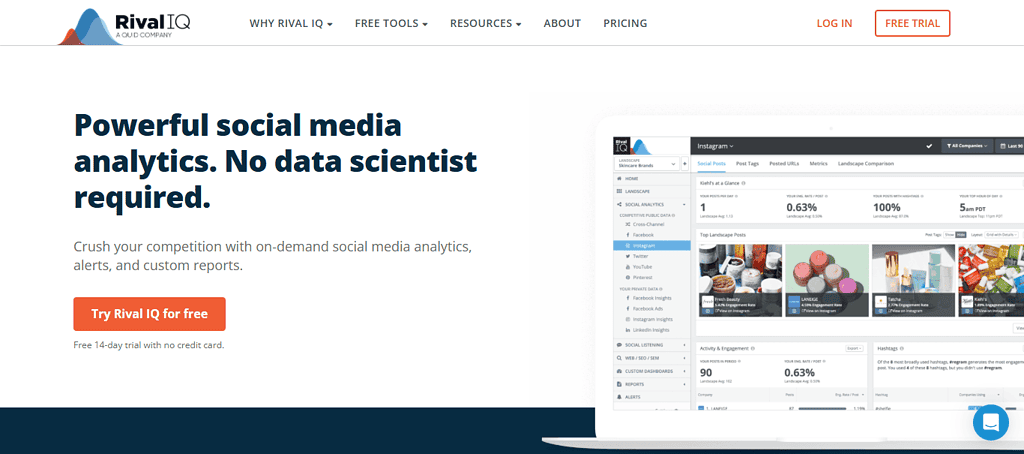
Rival IQ It supports major social platforms including Facebook, Instagram, Twitter (X), TikTok, and LinkedIn. Because of its rich feature set analytics, competitive benchmarking, and social listening, it’s often considered among the best social media reporting tools for agencies and creators handling multiple accounts.
Key Features
- Competitive Benchmarking & Boosted Post Detection: Rival IQ notifies you when a competitor likely boosts a post and shows how brands position themselves.
- Custom Dashboards & Reports: You can build dashboards, charts, and branded reports (PPT, PDF, CSV) to present to clients or stakeholders.
- Social Listening & Hashtag Analytics: Monitor brand mentions across the web and analyze hashtag trends in context.
- Multi-company Tracking & Swapping: You can add multiple client accounts (called “companies”) to your dashboard and swap which ones you’re actively tracking.
- Historical Data & Data Freshness: Some plans allow you to access up to 24 months of history, and metrics are updated with regular freshness intervals.
Pros
- Consolidates analytics, competitive benchmarking, and listening in a single tool, cutting the need for multiple subscriptions.
- Strong reporting flexibility, branded exports, scheduled reports, and custom dashboards make it easy to present insights.
- Insightful competitor data, including boosted post detection and profile comparisons, that help refine strategy.
Cons
- Cost can be high once you scale as adding more companies or users increases the monthly bill.
- In lower tiers, user seats are limited (e.g. basic plan sometimes allows just one user).
- For smaller creators or solo users, its complexity and pricing might be more than needed.
2. Keyhole
Price: Custom pricing with free demo
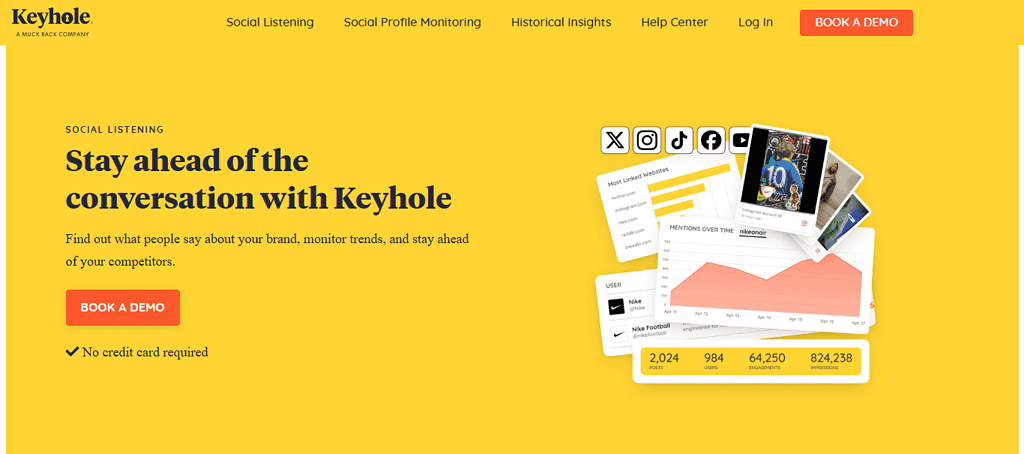
Keyhole is a strong social media analytics and reporting tool that focuses on real-time hashtag tracking, influencer performance, and campaign monitoring across platforms. It’s well suited for creators, agencies, and marketers who run hashtag campaigns or influencer collaborations.
Key Features
- Hashtag & Keyword Tracking: Monitor campaign tags or keywords in real time across Instagram, Twitter (X), and Facebook.
- Influencer Analytics: Rank and analyze influencers’ reach, engagement, and audience demographics.
- Custom Reports and Dashboards: Build shareable, visual reports with charts and exports.
- Historical Insights: View past data to spot long-term trends, especially useful in Twitter / X contexts.
- Sentiment & Trend Detection: Get clues about how audiences feel and what topics are rising.
Pros
- Excellent for tracking hashtags and campaign performance in depth.
- Reports are easy to share and visually adjustable.
- Strong reputation among marketers for combining listening with analytics.
Cons
- Steep learning curve for new users.
- Limited support or weaker coverage for some platforms.
- Prices can be high for solo creators or small teams.
- If you only need simple metrics, Keyhole might feel too advanced
3. Brandwatch
Price: Custom pricing with free demo
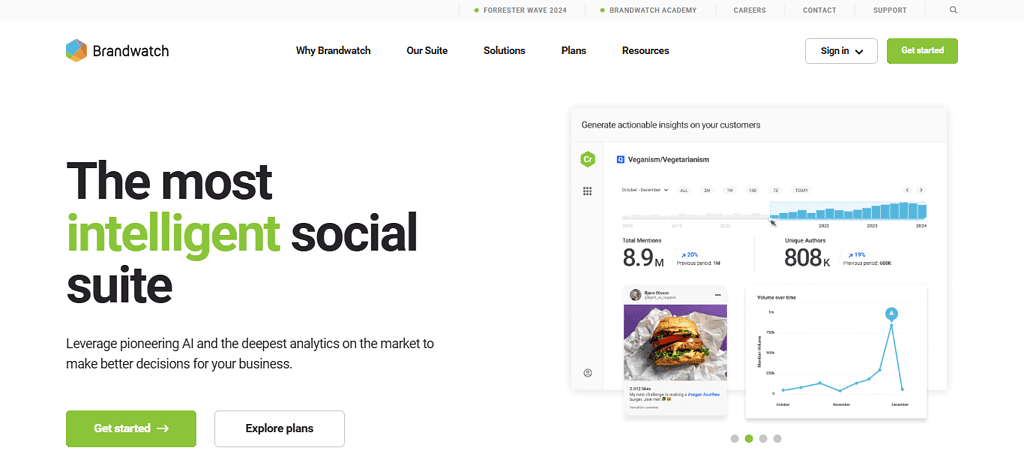
Brandwatch is often seen as a powerful platform for brand monitoring and audience insights, especially at a larger scale. It’s one of the top best social media analytics tools for creators, but leans more toward enterprise and PR usage. It integrates social listening, trend analysis, and deep data from many sources (not just social media).
Key Features
- Custom Dashboards & Queries: Highly flexible analytics you can slice by topics, demographics, sentiment.
- Large Historical & Source Coverage: Access data from many years and across platforms & media (forums, news, reviews).
- Share of Voice & Trend Tracking: Detect your brand’s prominence in conversations and emerging topics.
- Sentiment & Topic Analysis: Automatically classify whether mentions are positive, negative, or neutral.
- Integrations with PR & Communications Tools: Consolidate social monitoring with broader media and communication workflows.
Pros
- Very deep, rich analytics making it an excellent option for brands that want granular insight.
- Good for trend spotting and strategic planning.
- Custom dashboards let you tailor what matters most.
Cons
- Cost can be a barrier for small businesses or creators.
- Reports and interfaces are powerful but may feel complex for a beginner.
- Contract terms or renewals may lock you in longer than desired.
4. Hootsuite Analytics
Price: Starting at $99/month (30-day free trial)
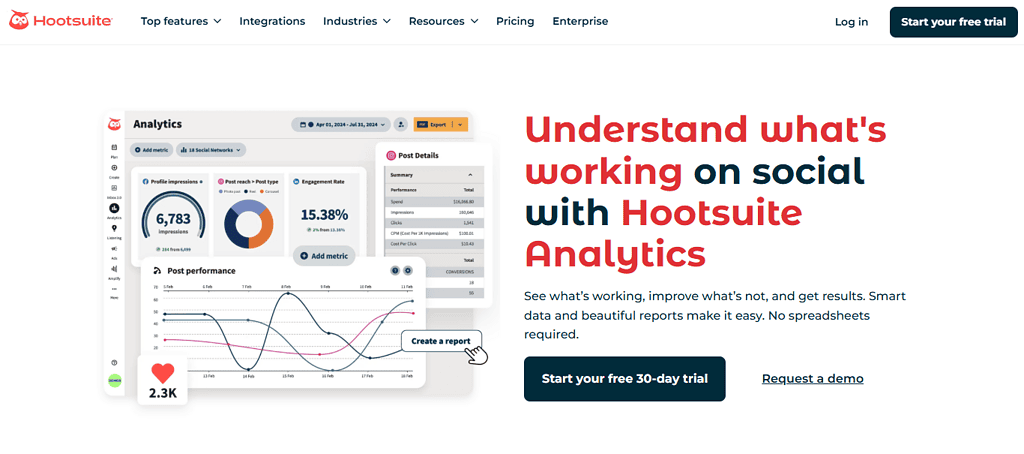
Hootsuite is a familiar name in social media tools and combines scheduling, management, and analytics in one package. Many consider it among the best social media reporting tools for its versatility. Its appeal is how much it can do in a single interface.
Key Features
- Unified Dashboard: View data from multiple platforms (Facebook, Instagram, X, LinkedIn, and more) in one place.
- Competitor & Industry Benchmarking: Compare your metrics with peers and see how your content stacks up.
- Social Listening & Sentiment: Detects brand mentions, trends, and public sentiment via AI tools.
- Exportable Custom Reports: Build branded reports in formats like PDF or CSV.
- Scheduling + Optimal Time Suggestions: Hootsuite suggests when to post for the best engagement.
Pros
- Has a good balance as it maintains strong functionality without being overly complicated.
- Helps you see how social drives website traffic and conversions.
- Broad platform support with many networks supported.
Cons
- Can be expensive, especially if you want many users or profiles.
- Some metrics especially for video or niche platforms may lag or be less detailed
- Dashboard can get crowded with many accounts
- Some users report occasional sync or API issues when connecting certain profiles
5. Buffer Analytics
Price: From $5/month per channel (14-day trial)
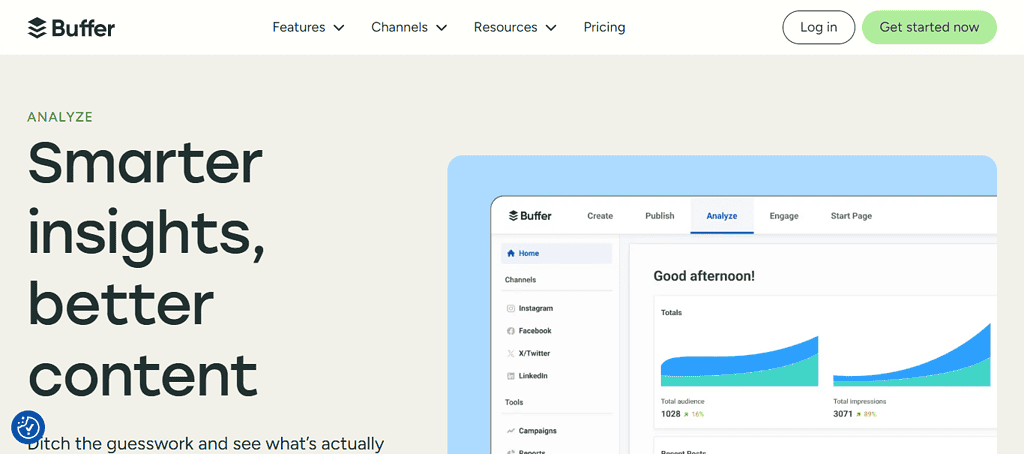
Buffer is known for its clean design and straightforward scheduling, but it also offers reporting features that help measure performance. Many small businesses and solo creators consider it one of the best social media reporting tools because it balances ease of use with solid insights.
Key Features
- Post Performance Reports: Track engagement metrics like reach, clicks, and comments across platforms. (buffer.com)
- Audience Growth Tracking: See follower growth over time and what content drives it.
- Team Collaboration: Add teammates to manage posts and insights together.
- Optimal Timing Suggestions: Helps find the best times to post for engagement.
- Exportable Reports: Download metrics in simple, clear charts.
Pros
- Very easy to use, even for beginners.
- Clean, uncluttered reports with no overwhelming data.
- Affordable pricing compared to many alternatives.
Cons
- Reports aren’t as deep as enterprise-level tools.
- Advanced reporting locked to higher plans.
- Not ideal if you need heavy-duty analytics.
6. HubSpot Marketing Hub
Price: From $890/month (30-day free trial)
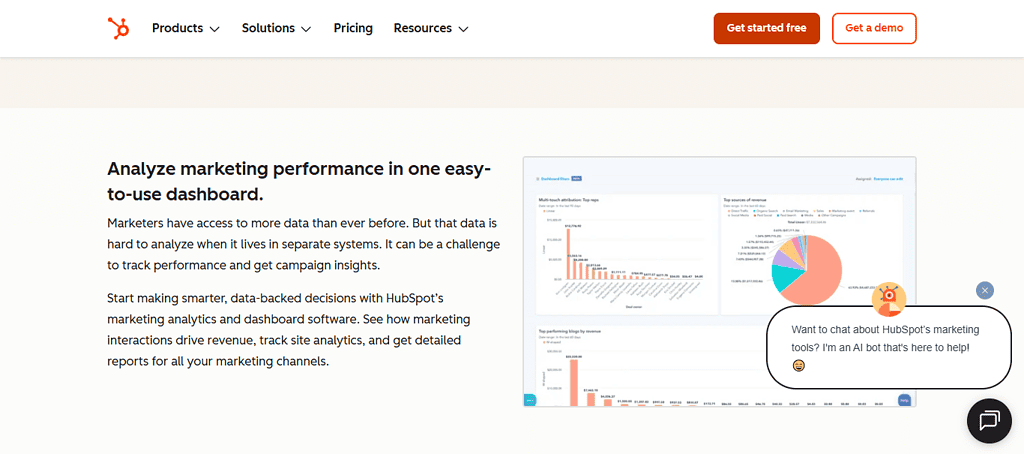
HubSpot is much more than a social tool; it’s a CRM, marketing automation, and analytics platform. It also provides a strong integration with other HubSpot hubs making it useful for people onboard already. For creators that already use HubSpot, its social media analytics and reporting tools offer the benefit of connecting social performance directly to leads and sales.
Key Features
- Integrated Social & CRM Data: Track how social campaigns generate leads and customers.
- Cross-Channel Analytics: Measure performance across Facebook, Instagram, LinkedIn, and X.
- Campaign Attribution: See which social posts are tied to conversions or sales.
- Monitoring & Engagement Tools: Reply to comments and messages within HubSpot.
- Customizable Reports: Build dashboards combining social and business metrics.
Pros
- Excellent for businesses that care about ROI, not just engagement
- Connects social data with email, sales, and website activity
- Advanced automation alongside reporting.
Cons
- Pricing is higher since it’s tied to broader HubSpot plans
- Learning curve is steeper than lighter tools like Buffer
- Best value comes if you’re fully invested in HubSpot’s ecosystem
7. Iconosquare
Price: From $79 per month
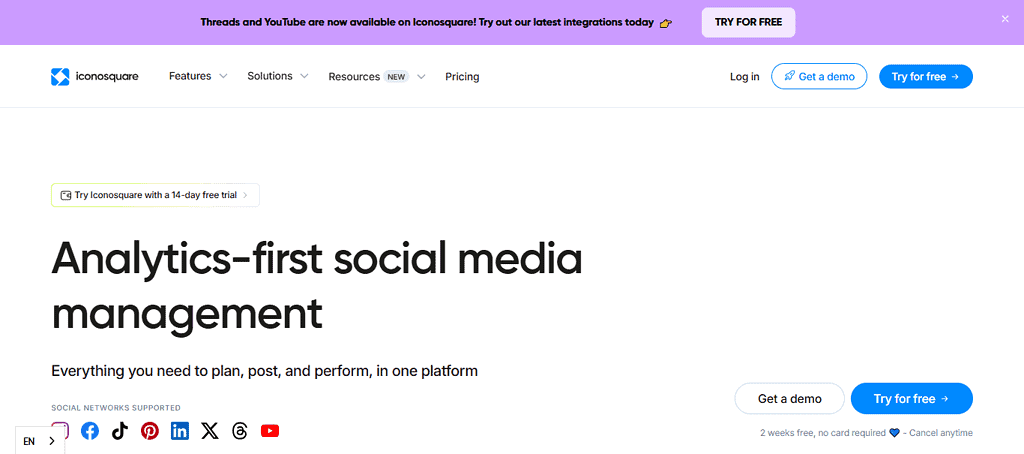
Iconosquare is highly focused on analytics, particularly for Instagram, TikTok, Facebook, and LinkedIn. Many brands consider when they want deeper insights into visual and influencer-driven platforms.
Key Features
- In-Depth Instagram & TikTok Analytics: Track engagement, reach, impressions, and audience demographics.
- Competitor Tracking: Benchmark your performance against rivals in your niche.
- Hashtag & Content Performance: Identify top-performing tags and posts.
- Scheduling + Preview: Plan and preview posts visually before publishing.
- Downloadable Reports: Create professional PDF or CSV reports for teams or clients.
Pros
- Very strong analytics for Instagram and TikTok creators.
- Easy to track what’s working in terms of hashtags and content styles.
- Clean interface that balances data depth with usability.
Cons
- Focus is narrow as it has less coverage for platforms like Pinterest or YouTube.
- Can get expensive if you need many profiles or users.
- Historical depth may be smaller than enterprise platforms.
Creating great content is only half the work; knowing how it performs is what drives real success. With the best social media reporting tools, you can track important metrics that will guide your future posting.
These insights help creators and businesses turn data into smarter strategies that deliver stronger results.
1. Track content performance across platforms
Not all your posts will perform the same way. But using social media analytics and reporting tools lets you measure which content drives the most likes, comments, and shares. These insights help you focus more on successful formats while reducing efforts on underperforming ones. This ensures your content works harder to meet your goals.
2. Find the best times to post
Posting when your audience is most active can dramatically improve engagement. The best social media reporting tools reveal peak activity hours across different platforms. Aligning your content schedule with these times means you maximize visibility and reach. This small adjustment can boost growth and ensure your efforts never go unnoticed.
3. Measure paid campaign effectiveness
Investing in ads without proper tracking can waste money. Social media analytics and reporting tools show which campaigns generate clicks, conversions, and revenue. With these insights, you can reallocate budgets toward high-performing ads and stop spending on ones that don’t work. This guarantees your advertising delivers measurable returns instead of guesswork.
4. Understand audience demographics and Interests
The best social media reporting tools provide detailed audience insights like age, gender, location, and interests. This information helps you design content that feels more personal and relevant. When people see posts that speak directly to them, they engage more, share more, and develop loyalty to your brand.
5. Improve competitor benchmarking
Competition online is tough, and knowing where you stand is vital. Reporting tools allow you to compare your growth, engagement, and reach with others in your industry. These benchmarks highlight opportunities you may be missing. When you analyze your competitor’s performance, you can adjust your own strategy and stay ahead of the game.
6. Identify trends for future content
Trends change quickly, and businesses that adapt early often benefit the most. Social media analytics and reporting tools highlight shifts in engagement, hashtags, or content formats before they peak. Spotting trends early ensures you can create timely content that captures attention and positions your brand as innovative and relevant.
Finally
Success on social platforms depends on creators understanding what works and why. And with the aid of the best social media reporting tools, you can easily track key metrics, study audience behavior, and measure campaign performance with accuracy.
Creators, brands, businesses and professionals who want to succeed know that using the best social media analytics tools can help them gain the power to make smarter decisions, save time, and boost engagement. In simple terms, the right social media analytics and reporting tools can transform guesswork into growth.




